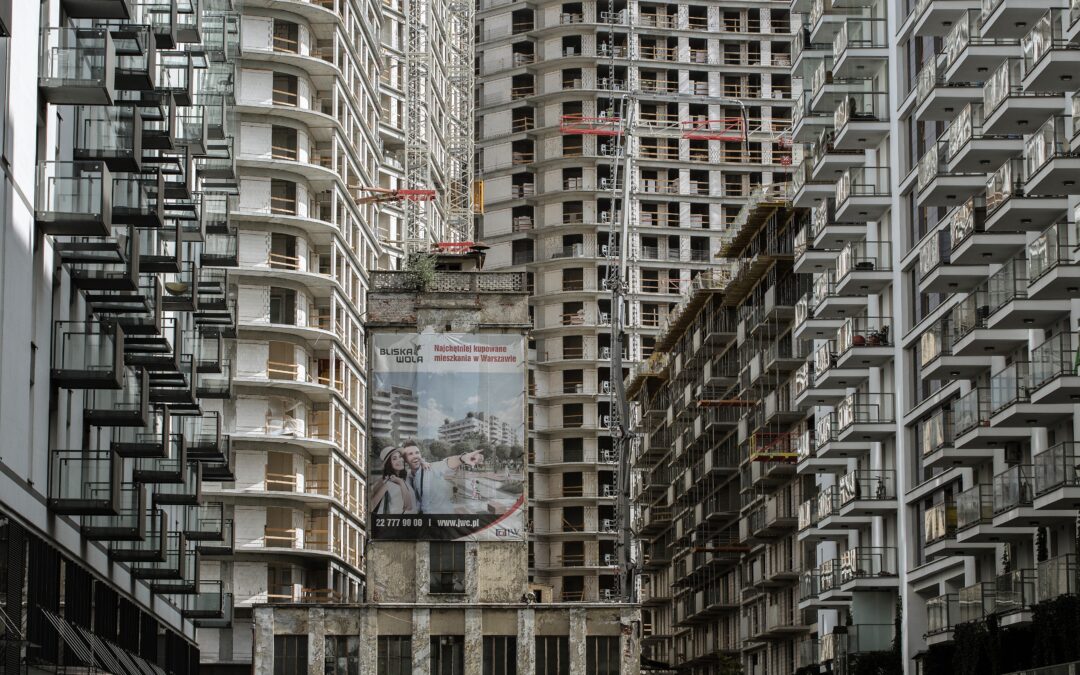Warsaw’s municipal authorities have refused to issue certification for 157 “micro-apartments” in a new building complex nicknamed by locals “Hong Kong” for its tightly packed blocks. Some of the properties, officially built as hotel rooms, are below the statutory minimum size for residential dwellings.
The site’s developer, however, has condemned the “incompetence, ignorance and obstructiveness” of local officials, arguing that his firm and its clients who have purchased the properties are acting legally
The development follows an announcement last month by the government that it would seek to clamp down on widespread practices that have led to many new developments containing small apartments crammed closely together, often with little natural light, privacy and green space.
The government has set out plans to combat "patodeweloperka" – a term meaning "pathological development" and which refers to building practices that create small apartments crammed closely together, often with little natural light, privacy and green space https://t.co/QE6OcxsoZX
— Notes from Poland 🇵🇱 (@notesfrompoland) January 9, 2023
The development in question, in Warsaw’s Wola district, contains over 3,000 apartments, commercial units and offices on a plot of land with a perimeter of 500 metres.
Some of the properties are advertised by developer JW Construction as “micro-apartments”. They include units below the 25 square metres required under Polish law for residential properties, with the smallest being 18 square metres in size, reports the Gazeta Wyborcza daily.
Officially they were built under a permit for a hotel, which would allow the rooms to be that small. But in fact they do not function as part of the hotel but are rather sold on the open market, city officials told the newspaper.
As a result, the authorities have refused to issue certification for them. They also told Gazeta Wyborcza that JW Construction has in any case not even demonstrated that the rooms meet the requirements for a hotel, as is required under regulations.
Ratusz odmawia stwierdzenia samodzielności ponad 150 lokali w tzw. Hongkongu, które powstały jako hotel. Dzięki udawaniu hotelu lokale mogą udawać mieszkania o metrażach od 18 m kw. Gdyby je budować jako mieszkania, musiałyby mieć co najmniej 25 m kw. https://t.co/j9HWjE0ouX
— Michał Wojtczuk (@MichaWojtcz) February 22, 2023
The founder, owner and chairman of JW Construction, Józef Wojciechowski, who is one of Poland’s richest people, condemned the actions of Warsaw’s authorities in a statement issued today to Business Insider Polska.
“The obstructive action of the officials of Warsaw city hall is to the detriment of people who – in accordance with the law and applicable regulations – purchased premises in a property built on the basis of a permit issued by the same architectural office of the Warsaw city hall,” said Wojciechowski.
“[It is] an example of official incompetence and ignorance and confirms the burdensomeness of the behaviour of officials at Warsaw city hall,” he added.
The developer argues that those who have purchased the “micro-apartments” have done so to operate them as short-term rental properties, which “is a form of providing hotel services”. He says that all contracts make clear that the properties are non-residential and sales are taxed accordingly.
Urzędnicy z Warszawy uznali, że 157 lokali w inwestycji na Woli miało być pokojami hotelowymi, a nie mieszkaniami i odmawiają wydania tzw. zaświadczenia o ich samodzielności. Józef Wojciechowski, przewodniczący Rady Nadzorczej spółki J.W. Construction,… https://t.co/yVGw6gptjh
— Business Insider Polska 🇵🇱 (@BIPolska) February 24, 2023
The dispute between JW Construction and Warsaw’s authorities is now likely to be settled in court, notes Gazeta Wyborcza.
Meanwhile, under the new plans unveiled last month by the government, developers would be prevented from building “commercial units” smaller than 25 square meters and then selling them as apartments.
Residential buildings will also be required to be built at least six metres from the edge of a plot, not four as currently. There would also be a requirement for at least a four-metre gap between balconies or the installation of partitions between them.
The minimum daylight exposure for residential properties would be increased from three to three and half hours, calculated on equinox days between 7 a.m. and 5 p.m.
Residents, activists and architects are finding ways to treat three "diseases" that blight Poland's cities: "concretitis", "advertitis" and "pastelitis".
Little by little, they are healing an urban landscape scarred by history, writes @AlicjaPtak4 https://t.co/IltIpemG3o
— Notes from Poland 🇵🇱 (@notesfrompoland) August 1, 2022
Main photo credit: Adam Stepien / Agencja Wyborcza.pl

Alicja Ptak is deputy editor-in-chief of Notes from Poland and a multimedia journalist. She has written for Clean Energy Wire and The Times, and she hosts her own podcast, The Warsaw Wire, on Poland’s economy and energy sector. She previously worked for Reuters.




















